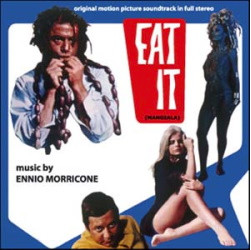主页--->m-comment-000--->mb-comment-005-53
|
电脑版 |
|||||||||||||||||||||||||||||||||||||||||||||||||
布罗克斯顿评说莫里康内 MB-005-53 |
||||||||||||||||||||||||||||||||||||||||||||||||||
FA6806 Eat it / Mangiala
/ 吃吧 |
||||||||||||||||||||||||||||||||||||||||||||||||||
作者 乔纳森·布罗克斯顿 (Jonathan Broxton) |
||||||||||||||||||||||||||||||||||||||||||||||||||
ENNIO MORRICONE 评论,第5部分 005-53 |
||||||||||||||||||||||||||||||||||||||||||||||||||
 |
||||||||||||||||||||||||||||||||||||||||||||||||||
吃吧 [吃吧] (1968) Mangiala,或 Eat It,是一部意大利喜剧电影,由弗朗切斯科·卡萨雷蒂执导,弗兰克·沃尔夫、保罗·维拉乔和詹皮耶罗·阿尔贝蒂尼主演。这是莫里康内历史上最晦涩、最鲜为人知的电影之一。我能找到的关于这部电影的为数不多的信息之一将其描述为“对消费社会中广告的怪诞讽刺,其中谁吃了太多罐头小麦就会变成一头牛”。我不确定这是否让我想多看还是少看,但它肯定是独一无二的。 莫里康内的配乐同样古怪,从一种风格跳到另一种风格,融合了从古典主题和浪漫主题到音乐童谣、充满活力的波萨诺瓦节奏、抽象实验主义令人不安的时刻等等,所有这些都旨在——正如 CD 衬垫注释所述——“拥抱标志着电影情节的疏离和悖论的所有心理和环境细微差别。 主旋律“Eat It”从一种风格跳到另一种风格,从管弦乐队和钟声的一首奇怪的平静和愉快的作品开始,但很快变成了吉他-大键琴-打击乐组合的罂粟花和漂亮的编曲,以及似乎在演奏雅克兄弟 (Frere Jacques) 旋律的键盘。其余大部分配乐都是基于这些核心思想的变化,增加了爵士乐的质感和热带律动,听起来很棒,但似乎与电影本身完全不一致。 我特别喜欢“Notti di Pace”中古怪的大键琴和键盘由郁郁葱葱的弦乐支撑的方式,“Amami”的梦幻般的质感,“Ballami”的刺耳探戈节奏,“Africami”中催眠的部落节拍和模糊的电吉他,“Pianofortecciami”中的honkytonk钢琴爵士乐,以及“Falsa Sacrilita”中当代教堂音乐风格和前卫摇滚的美妙结合。“ 尤其是当无可挑剔的合唱团 I Cantori Moderni di Alessandro Alessandroni 在最后出现时。 可以肯定的是,《Eat It》是一个奇怪的乐谱,当你第一次听它时,你永远不确定莫里康内在的确切位置,或者他从一个提示到下一个提示在做什么。然而,它包含了莫里康内 1960 年代许多伟大的风格和一些独特的标志,这意味着他的粉丝会喜欢它,尤其是那些更适应他对迷幻和欧洲流行音乐的实验的人。这里审查的乐谱版本是 Digitmovies 于 2010 年作为独立专辑发行的版本,包含 45 分钟的音乐。较短的版本也以 2 对 1 版本的形式提供;通常在 CAM 标签上与 1975 年乐谱 Macchie Solari 的乐谱配对。 曲目列表: 1. Eat It (Theme) (2:58), 2.第一变奏:吃掉我 (2:00), 3.和平之夜(第二变奏曲)(2:26),4。第三变奏 爱我 (1:48), 5.第四变奏:跳舞我 (1:39), 6.第五变奏:Africami (2:01), 7.第六变奏:钢琴 (1:10), 8.第七变奏:Temimi (3:34), 9.第七变奏:Temimi(第二版)(2:1),12。第八变奏:捏我 (10:1), 45.吃它 (11:1), 57.虚假的神圣性(12:6),57。“吃吧”(代表13)(2:1),第42页。和平之夜(14:1),第46页。第一变奏:吃掉我(代表 15) (2:2), 58.第七变奏:Temimi(第三版)(16:3),1。第一变奏:吃掉我(代表 04) (17:3), 1.第六变奏:钢琴(Rep.40)(18:2),1。吃它(代表 50) (19:3), 1.“Eat It” (单曲) (29:20).Digitmovies CDDM-3,47 分 172 秒。 |
||||||||||||||||||||||||||||||||||||||||||||||||||
2020.8.2 |
||||||||||||||||||||||||||||||||||||||||||||||||||
|
| ||||||||||||||||||||||||||||||||||||||||||||||||||
以下是原文
| ||||||||||||||||||||||||||||||||||||||||||||||||||
ENNIO MORRICONE REVIEWS, Part 5-53 |
||||||||||||||||||||||||||||||||||||||||||||||||||
Mangiala, or Eat It, is an Italian comedy film directed by Francesco Casaretti, starring Frank Wolff, Paolo Villaggio, and Giampiero Albertini. It’s one of the most obscure and little known films in Morricone’s history; one of the few pieces of information I could find about the film describes it as ‘a grotesque satire on advertising in a consumer society, wherein whoever eats too much tinned wheat turns into a cow’. I’m not sure whether that makes me want to see it more or see it less but it’s certainly unique. Morricone’s score is equally quirky, jumping around from style to style and incorporating everything from classical motifs and pretty romantic themes, to musical nursery rhymes, vibrant bossa nova rhythms, disturbing moments of abstract experimentalism, and more, all of which are intended to – as the CD liner notes state – ‘embrace all the psychological and environmental nuances of alienation and paradox that mark the plot of the film.’ The main theme, “Eat It,” jumps around from style to style, beginning with an oddly calming and pleasant piece for orchestra and chimes, but which then quickly becomes a poppy and pretty arrangement for a guitar-harpsichord-percussion combo, and a keyboard which seem to be playing the melody from Frere Jacques . Much of the rest of the score is based on variations on these core ideas, with added jazz textures and tropical grooves that are great to listen to, but seem to be completely at odds with the film itself. I especially like the way the quirky harpsichords and keyboards are underpinned by lush strings in “Notti di Pace,” the dream-like textures of “Amami,” the strident tango rhythms of “Ballami,” the hypnotic tribal beats and fuzzy electric guitars in “Africami,” the honkytonk piano jazz in “Pianofortecciami,” and the wonderful combination of contemporary church music stylings and prog rock in “Falsa Sacrilita,” especially when the unmistakable choir I Cantori Moderni di Alessandro Alessandroni comes in at the end. Eat It is an odd score, to be sure, and when you first listen to it you’re never sure exactly where Morricone is going or what he’s doing from one cue to the next. However, the fact that it contains so many of Morricone’s great 1960s stylistics and little idiosyncratic hallmarks means that fans of his will love it, especially the ones who are more attuned to his experimentations with psychedelia and Euro-pop. The version of the score reviewed here is the one released as a standalone album by Digitmovies in 2010, and contains 45 minutes of music. Shorter releases are also available in 2-for-1 releases; usually on the CAM label paired with the score for the 1975 score Macchie Solari. Track Listing: 1. Eat It (Tema) (2:58), 2. Prima Variazione: Mangiami (2:00), 3. Notte di Pace (II Variazione) (2:26), 4. Terza Variazione Amami (1:48), 5. Quarta Variazione: Ballami (1:39), 6. Quinta Variazione: Africami (2:01), 7. Sesta Variazione: Pianofortecciami (1:10), 8. Settima Variazione: Temimi (3:34), 9. Settima Variazione: Temimi (2a Versione) (1:12), 10. Ottava Variazione: Pizzicami (1:45), 11. Eat It (1:57), 12. Falsa Sacralità (6:57), 13. Eat It (Ripresa 2) (1:42), 14. Notte Di Pace (1:46), 15. Prima Variazione: Mangiami (Ripresa 2) (2:58), 16. Settima Variazione: Temimi (3a Versione) (1:04), 17. Prima Variazione: Mangiami (Ripresa 3) (1:40), 18. Sesta Variazione: Pianofortecciami (Ripresa 2) (1:50), 19. Eat It (Ripresa 3) (1:29), 20. Eat It (Versione Singolo) (3:47). Digitmovies CDDM-172, 45 minutes 43 seconds. |
||||||||||||||||||||||||||||||||||||||||||||||||||
Aug 2, 2020 |
||||||||||||||||||||||||||||||||||||||||||||||||||
本站电影欣赏 |
||||||||||||||||||||||||||||||||||||||||||||||||||
在线音乐试听 |
||||||||||||||||||||||||||||||||||||||||||||||||||
|
||||||||||||||||||||||||||||||||||||||||||||||||||
 |
||||||||||||||||||||||||||||||||||||||||||||||||||
Jon 是一位电影音乐评论家和记者,自 1997 年以来一直担任全球最受欢迎的英语电影音乐网站之一 Movie Music UK 的编辑和首席评论员,并且是国际电影音乐评论家协会 (IFMCA) 的主席。在过去的 20多 年中,Jon 撰写了 3,000 多篇评论和文章,并进行了多次作曲家采访。在杂志刊物方面,乔恩曾为《电影配乐月刊》、《原声带杂志》和《电影音乐》等出版物撰写评论和文章,并为普罗米修斯唱片公司的两张经典 Basil Poledouris 配乐专辑《Amanda》和《Flyers / Fire on the Mountain》撰写了衬垫注释。他还为汤姆·胡佛 (Tom Hoover) 于 2011 年出版的《Soundtrack Nation: Interviews with Today's Top Professionals in Film, Videogame, and Television Scorering》一书撰写了一章。在1990年代后期,乔恩是伦敦皇家爱乐乐团的电影音乐顾问,并与他们合作拍摄了约翰·德布尼(John Debney)的音乐电影《相对价值》(Relative Values)和奥利弗·海斯(Oliver Heise)的音乐《佛陀的指环》(The Ring of the Buddha),以及与兰迪·纽曼(Randy Newman)合作的一系列音乐会。2012年,乔恩在波兰克拉科夫举行的第五届年度电影音乐节上担任“电影节学院”主席。他是作曲家和作词家协会的成员,该协会是作曲家、作词家和词曲作者从事电影、电视和多媒体工作的首要非营利组织。 |
||||||||||||||||||||||||||||||||||||||||||||||||||
2023.11.28 |
||||||||||||||||||||||||||||||||||||||||||||||||||
2023 手机版 |
||||||||||||||||||||||||||||||||||||||||||||||||||
|
||||||||||||||||||||||||||||||||||||||||||||||||||













